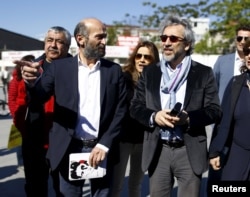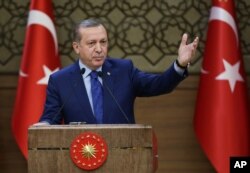In Turkey, the trials started on Friday for four academics charged with terrorist propaganda after signing a petition. The case also resumed for two prominent journalists facing charges of espionage and aiding a terrorist organization for an article they wrote.
The cases are raising growing concerns both nationally and internationally over human rights in Turkey.
Hundreds of people gathered outside Istanbul’s main court for what was described as a festival of justice. The gathering was in support of four academics and two journalists facing terrorism charges. Can Dundar, chief editor of Cumhuriyet, one of Turkey’s last remaining mainstream newspapers critical of the government, and his colleague Erdem Gul, face 30 years in jail.
Prosecutors accuse the journalists of espionage and working with a terrorist organization for a report in which they allege the Turkish government smuggled arms to Syrian rebels.
After a short hearing Friday, the case was adjourned until next month.
A defiant Dundar said he welcomes having his case coinciding with the academics'.
Today we are much stronger together here, he says, adding "I believe that the force for opposition and resistance starts from the door of the court cases, that's how it's become."
Dundar’s court proceedings now are held in secret, a decision the court made after several senior foreign diplomats attended the first session of the trial. Turkish President Recep Tayyip Erdogan, who is demanding the journalists' be convicted, condemned the presence of the diplomats.
Political columnist Semih Idiz, with the Cumhuriyet and Al Monitor websites, says the case has become a political battle for Erdogan.
"Erdogan has said quite openly that Dundar would pay for this and he would pay quite dearly. And having said this in front of the public, and his own constituents I think he feels that he has to push this through and somehow get a conviction for Can Dundar."
Erdogan has also been pushing for convictions for 1,100 academics who signed a petition calling for an end to a crackdown of the Kurdish rebel group the PKK and a resumption of peace talks. The four on trial Friday face more than seven years in prison on terrorist propaganda charges.
In court, the defendants reiterated their support for the petition and demanded their acquittal. The court rejected that demand, but did release them from jail. Turkey researcher Emma Sinclair Webb of the U.S.-based Human Rights Watch says the court cases are part of a concerning use of Turkey’s anti-terror laws.
"Basically this means you can go after any kind of government critic or political opponent on the grounds that somehow promoting, in the vaguest terms, terrorism. So it's an extremely worrying move."
Turkey’s European and U.S. allies are voicing growing concern for freedom of expression and other human rights. But Ankara dismisses their concerns, saying it faces unprecedented terror threats from Kurdish rebels and Islamic State militants.






